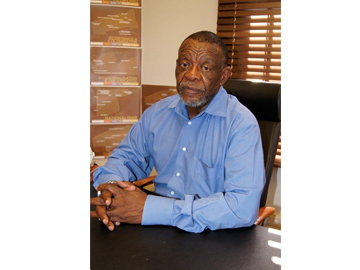Rumours: an extract from Mongane Wally Serote’s latest novel

Prolific and acclaimed South African poet and writer Mongane Wally Serote, one of only two African writers (the other being Leopold Sedar Senghor) to be honoured with the Golden Wreath Award for a lifetime achievement in poetry, focuses his attention on 21st century South Africa in his latest novel, Rumours.
The protagonist is Keke, an MK veteran and former CEO of a mobile phone company. But now Keke’s life is in ruins. His marriage has collapsed, and he has taken refuge in the treacherous succour of alcohol.
It is only when he meets Ami, a shaman from Mali, who leads him on a spiritual journey, that he reaches a new understanding of his role in post-apartheid South Africa.
Keke is an allegorical figure for a South Africa that has lost its way. Serote fervently argues for a reconnection with African heritage to set matters right.
The text is forthright in political opinions and regularly launches into diatribes. One may not always agree with the stance taken, but they are entertainingly expressed, always interesting and often provocative.

Dr Serote
Extract: Rumours
All of us will come to an end, Keke was thinking as he leant over the rail facing a calm sea. A few ships shimmered and danced on the horizon, heading for Durban’s busy harbour. He was feeling low. The past days had been heavy, almost overwhelming. He had learnt all kinds of skills, but not how to face such personal challenges. What should he do? How could he resolve this utter depression? Life was weighing heavily on him. He had lost almost everything, but he was trying to be honest and courageous. He had tried hard to be a good person, but all in vain. He had always known that nothing could last forever, but he realised now that to actually experience it was very different from merely knowing it. A ship sounded its horn as it cruised out to sea. He was vaguely aware of the roar of traffic somewhere behind him and the faceless footsteps of joggers, tourists, homeless people and countless others going about their business. Each fading car roar, footstep and siren reminded him afresh that everything was fleeting. Even the ships cruising steadily across the shining expanse of blue water would have to come to a halt or end up in the sand if they continued on their course.
He sank back into sadness as he remembered why he was here. He had sunk into a depression since his wife had left their home and taken the children. He had stopped going to work. Nothing in his life made sense any more. He couldn’t even say he still had a home. Whatever savings he had would probably have to be split between himself and his children, Thalitha and Thebe. For the first time in their life together, if he were asked the whereabouts of his wife, Mmabatho, he wouldn’t be able to answer. She had tried to tell him that everything would be all right. But he felt a deep sense of loss. Even the sky was pressing down on him. As a young man shuttling between Alexandra and Soweto, he had taken a decision that had changed his life forever. How did people make decisions? Had he even had a choice? Not that he regretted it, but decisions bring changes; they catapult one into the unknown and carve journeys and destinations into unfamiliar terrain. His journey has brought him here to this railing facing the sea, and he wondered what it would be like to be on one of those ships floating across the horizon.
He tried to laugh at himself. Why was he in this state now? By all standards, he had had a lucrative job. Yet something inside him had snapped, and he had simply abandoned it. He would soon be without a salary, without any income. Yet before that he had never had an income. He had crisscrossed southern Africa from country to country, fighting in a war of liberation as an armed cadre. He had taken his fate and put it into the hands of his people and his trainers in Swaziland, Angola and the Soviet Union. That strength, that knowledge had carried him this far. His cautious trust in himself and his people had delivered him, along with his belief that he was fighting a just war. And while he was in prison he had studied; that too had anchored him. When eventually he had emerged from underground it was agreed that he would take up a post in one of the wireless phone companies – called Catch and later renamed Salani – as a marketing and communications manager. Billboards were still shouting out his clever words and bright visuals – humorous creativity aimed at selling products in a money culture.
No, he regretted nothing about his life. He had always made his own calls; even now it was he who had stopped his car here, switched off the motor and walked up to lean on this railing facing the sea. He must make a decision. Something in his life had come to an end. He was tempted to sink into self-pity or to blame someone. All that gave him the strength not to was his inner voice, which kept on reminding him that everything passes.
Rumours by Mongane Wally Serote
Jacana Media
ISBN 978-1-4314-0530-5
278 pages
Review by Brent Meersman for GroundUp. You can follow Brent Meersman on Twitter @Brent_Meersman.
Next: Childish Gambino ““ Because the Internet
Previous: Cry the beloved Congo

This article is licensed under a Creative Commons Attribution-NoDerivatives 4.0 International License.


